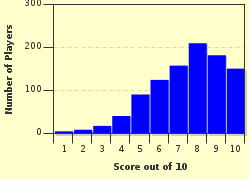Quiz Answer Key and Fun Facts
1. "Jenny, I've got your number," sang Tommy Tutone in 1982. "I need to make you mine." The narrator had found Jenny's telephone number written in graffiti on a wall. What is Jenny's number, the title of the song?
2. Some people embrace their identifying numbers; others rebel against them. Jean Valjean, protagonist of the novel and musical "Les Misérables," is one of the latter, categorically rejecting the number 24601. Why does he object to being known by this number?
3. In 1921, Yevgeny Zamyatin finished his masterpiece "We", one of the first-ever dystopian novels. In his imagined "One State", people have been reduced to numbers, and names are eliminated entirely. But the characters' numbers do give some information about them. The protagonist, for example, is called D-503 -- what does this number tell us?
4. After anchoring a television sitcom and playing a number of minor movie roles, comedian Bernie Mac got his big-screen break as the star of 2004's "Mr. 3000". In that movie, Mac plays Stan Ross, an arrogant sports star who has a change of heart. Why is he called Mr. 3000?
5. Science-fiction writers often turn to numbers when it's time to name their characters. After all, a "name" that's a number can suggest so many things, from robot model numbers to a society with an extreme lack of individuality. Which of these numbered sci-fi characters is NOT correctly matched with a work in which he or she appears?
6. Beginning in the 1940s, comic-book readers unsatisfied with their physiques found hope in advertisements for Charles Atlas's home bodybuilding program. Atlas's story, retold in ad after ad, was inspiring: once a scrawny youth, taunted by his peers, he used a simple method to become "the world's most perfectly developed man." How did he describe his former self in his advertisements?
7. You'll often hear movie and TV commanders addressing their subordinates by rank -- for example, "Star Trek: The Next Generation"'s Captain Picard calls first officer Will Riker "Number One." But in the "Austin Powers" series, Dr. Evil can't refer to one of his subordinates any other way: the man's rank IS his name. Who is this eyepatch-wearing mastermind, played by Robert Wagner and Rob Lowe?
8. Of course, no quiz like this would be complete without one well-numbered demographic: secret agents. One song, written by P. F. Sloan and Steve Barri, sums up their plight: "Secret agent man / Secret agent man / They've given you a number and they've taken away your name." In 1966, who had a U.S. Billboard Hot 100 hit with "Secret Agent Man"?
9. It's unclear what CONTROL would do if they lost Agent 99, one of their most effective agents against KAOS. Her bumbling partner would certainly find it difficult to go it alone! In her satirical spy-themed universe, chronicled in a television show and a couple of motion pictures, who is paired (professionally and romantically) with 99?
10. After twelve novels by Ian Fleming and over 21 big-budget pictures, James Bond -- Agent double-oh-seven -- is perhaps the most famous fictional spy in the world. His code number -- in addition to giving him the option of anonymity -- also gives a clue as to his status within MI6. In the James Bond universe, what does it mean when your code number begins with two zeroes?
Source: Author
CellarDoor
This quiz was reviewed by FunTrivia editor
Nannanut before going online.
Any errors found in FunTrivia content are routinely corrected through our feedback system.

